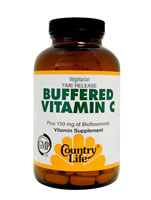|
Vitamin C is an antioxidant required for health tissue growth and repair, the production of anti-stress hormones, the metabolism and absorption of other vitamins and minerals, and for protection against the harmful effects of pollutants. Consistant and adequate use of Vitamin C results in the prevention of infections, and the enhancement of immunity. Its antioxidant properties promote healing and prevent free radical cellular damage. Because the body cannot manufacture Vitamin C, it must be obtained through the diet and or supplemented to receive maximum benefit.
The standard Vitamin C, known as Ascorbic Acid , is the least expensive and most common form of Vitamin C. Adding adequate levels of bioflavanoids will aid in its absorption. A buffered Vitamin C is available for individuals with a sensitivity to acidic foods,and the acidic quality of this vitamin in its most practical form.
Esterfied Vitamin C, known as Ester-C, is a remarkably effective form of Vitamin C, recognized for its absorption capabilities. It is created by having Vitamin C interact with a mineral, such as calcium or magnesium, resulting in a form of Vitamin C which is non-acidic, containing vitamin metabolites identical to those produced by the body. It is believed that Ester-C enters the bloodstream and tissues faster, more effectively, and remains in the body tissues much longer than a non-ester version of Vitamin C. Ester-C is popular for its non-irratating effect on the stomach. If you use large quantities of Vitamin C, a powdered version is available in both Ascorbic and Ester-C forms.
A recommended daily dosage of Vitamin C for an average adult ranges between 500mg-1000mg of supplementation. Due to its water soluable properties, and ease of excretion, effective doses of supplemental Vitamin C should be taken in divided doses, twice daily.
|

